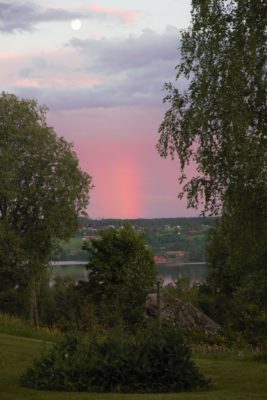Halsninger fra Sverige,
We have said farewell to Sweden, and in the process added yet another place to Linda’s Must-Go-Back-To list. That’s a growing list, but Sweden has a lot to offer.
The Swedish Tourist Association – an influential body – has a long-standing slogan: Känn Ditt Land (know your country). It’s certainly a country worth knowing.

Sweden is a land of green farmland, serene waterways and coniferous forests. It’s also a land of 24-hour clocks, lupins lining the roads and co-ordinated traffic lights. Perhaps the thing which delighted us so much was the level of civilisation: no rubbish on the streets; order on the waterways; worldly and open people interested in who we were and where we were from ; and architecture actually worth looking at. (The contrast with Dhaka is alive.)

As a nation, Sweden seems to have declined to sign the Maastricht Treaty so they have their own currency: the Swedish Kronor. They drive on the right hand side of the road, having calmly switched at 16:00 one afternoon in 1967, in order to conform to the rest of Europe.
blue and yellow
They do seem very patriotic people. Even the road signs are blue and yellow. The national ensign is seen all over the built environment; a bit too often for mine. The climate is benign in summer but it must be very tough in the long, dark winter months.
The current world chess champion is a Norwegian, with a climate very similar. It’s easy to see why the people would spend so much time indoors. In winter the lakes are frozen (thick enough for vehicular traffic) and the summers are fairly short. Chess has a strong foothold in cold countries and I have a feeling Magnus Carlsen – incidentally, a young bloke – is not the first Scandinavian to hold the position. (Curiously, Bangladesh now has five chess grandmasters – more than Australia – and the explanation as to why chess has caught on there is for identical reasons to Scandinavia (except that it’s the heat which drives people indoors there).

couples in single beds
Sweden’s reputation as an uninhibited, progressive and open society is probably well-founded, but there is one curious circumstance we can’t quite fathom. In almost every hotel/hostel we’ve stayed we have been allocated rooms with two single beds. It seemed so much the norm in fact that Linda would turn with an audible sigh from the unlocked door, laughing that querulous laugh of hers, saying, “single beds again”. I have developed a theory about this – especially now that we have seen the same phenomenon in Northern Scotland – it’s a function of latitude. It seems the further north you go, the more likely you are to have married couples sleeping in single beds. What’s going on there? Perhaps others can shed some light on this puzzle.






All of the Scandinavian countries produce good portions of their electricity via wind turbines. They seem to have conquered the erroneous arguments about alleged ugliness. They are well and truly a long way past the foundations of renewable energy, but still undergo robust public discussion about ways to boost renewable production in the future. Sweden has in fact two bob each way on this matter. They own coal mines in Germany and buy thermal power from there at the same time as exporting hydroelectricity; “hypocritical” says Ingemar in the bar at Saltoluokta.
religious schools
Ola says Sweden is “one of the most secular nations on Earth”. Yet, the growth of private schools there (almost matching Australia’s recent history) includes some religious schools. It’s certainly true that churches and cathedrals do not dominate skylines as they do in many other European cities and towns.

The Swedish Tourist Association’s slogan is a good one and one which seems to have been heeded by a good number. Lots of Swedes are out and about, getting to know their country in the warmer months. They certainly seem to be happy with their lot.
Tills vidare
Greg
Other photos from hereabouts



